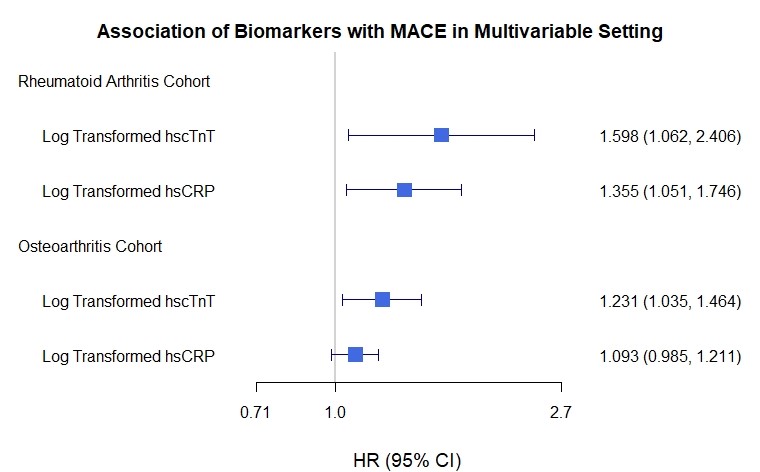Session Information
Date: Sunday, November 8, 2020
Title: RA – Diagnosis, Manifestations, & Outcomes Poster III: Cardiopulmonary Aspects
Session Type: Poster Session C
Session Time: 9:00AM-11:00AM
Background/Purpose: In rheumatoid arthritis (RA), excess mortality and inflammation has been attributed to cardiovascular (CV) diseases. High-sensitivity cardiac troponins (hscTnT) allow measurement of cardiac troponin concentrations below conventional levels of detection, and can be used to assess the severity of subclinical myocardial damage. Meanwhile, high-sensitivity C-reactive protein has traditionally been applied for CV risk stratification. We evaluated the prognostic relevance of hscTnT and hsCRP in RA and osteoarthritis (OA) patients enrolled in the PRECISION biomarker sub-study.
Methods: The PRECISION trial was a randomized, controlled non-inferiority clinical trial conducted worldwide involving patients who had RA or OA and with increased CV risk. We measured hscTnT (Roche Gen 5 STAT) and hsCRP (Roche) in a subset of 636 RA and 6,269 OA patients who participated in a biomarker sub-study. The primary CV outcome was major adverse cardiac events (MACE) which is defined as CV death, non-fatal myocardial infarction or non-fatal stroke, re-vascularization, hospitalization for unstable angina or transient ischemic attack) with at least 18 months of follow-up. Multivariable Cox proportional hazards models were developed with age, gender and baseline status of the following: CAD, diabetes, hypertension, and smoking status as covariates.
Results: In the study cohort, mean age was 63.6±9.4 years, 58% were female, 80% Caucasian, and 32.7% were aCCP positive in the RA cohort. In the total cohort, 17.8% had known coronary artery disease, 36.5% diabetes, and 80% hypertension. The median baseline hscTnT was 6.3ng/L (IQR 3.6, 10.3) and was similar between the cohorts: 5.6ng/L [IQR 3.0, 9.1] in RA and 6.4ng/L [IQR 3.6, 10.3] in OA. We observed that baseline hscTnT was a significant predictor of MACE during follow-up in the RA cohort (HR 1.60, 95%CI 1.06, 2.41), as well as in the OA cohort (HR 1.23, 95%CI 1.04, 1.46, see Figure). In contrast, there was weaker association between baseline hsCRP levels and MACE in RA (HR 1.36, 95% CI 1.05, 1.75) and no significant association in OA (HR 1.09, 95% CI 0.99, 1.21).
Conclusion: In our study cohort, baseline hscTnT was independently associated with major adverse cardiovascular events in both RA and OA. There was a stronger association for both hsCRP and hscTnT in the RA cohort compared to the OA cohort. Further prospective studies addressing the predictive role of hscTnT for CVD events in patients with OA and RA can help expand preventative treatment strategies.
To cite this abstract in AMA style:
Husni M, Solomon D, Shao M, Wolski K, Nissen S, Hazen S, Tang W. Serum High-sensitive Cardiac Troponin at Baseline Predict Cardiovascular Events in Rheumatoid Arthritis and Osteoarthritis [abstract]. Arthritis Rheumatol. 2020; 72 (suppl 10). https://acrabstracts.org/abstract/serum-high-sensitive-cardiac-troponin-at-baseline-predict-cardiovascular-events-in-rheumatoid-arthritis-and-osteoarthritis/. Accessed .« Back to ACR Convergence 2020
ACR Meeting Abstracts - https://acrabstracts.org/abstract/serum-high-sensitive-cardiac-troponin-at-baseline-predict-cardiovascular-events-in-rheumatoid-arthritis-and-osteoarthritis/

